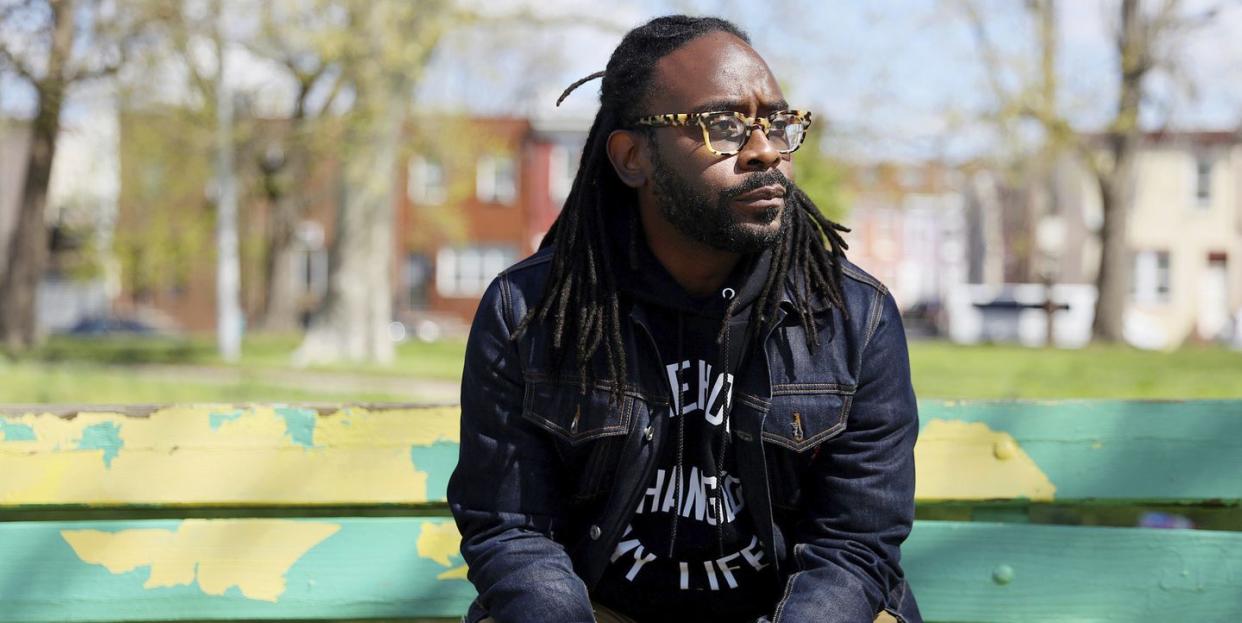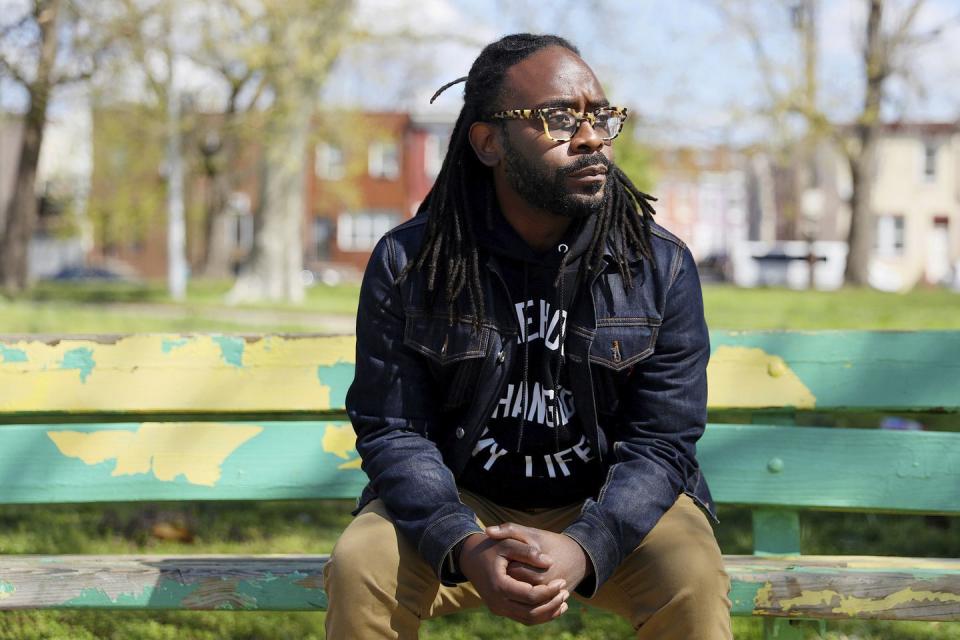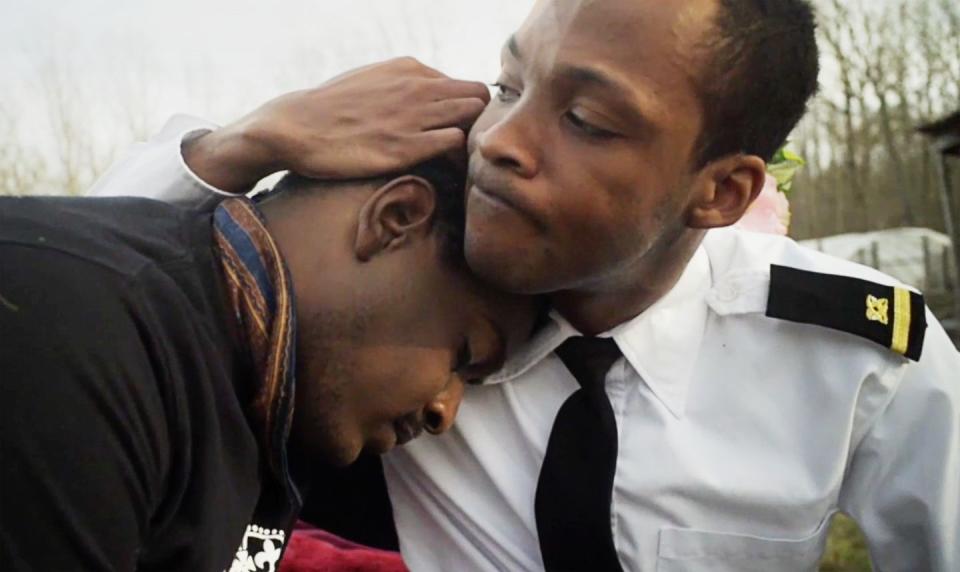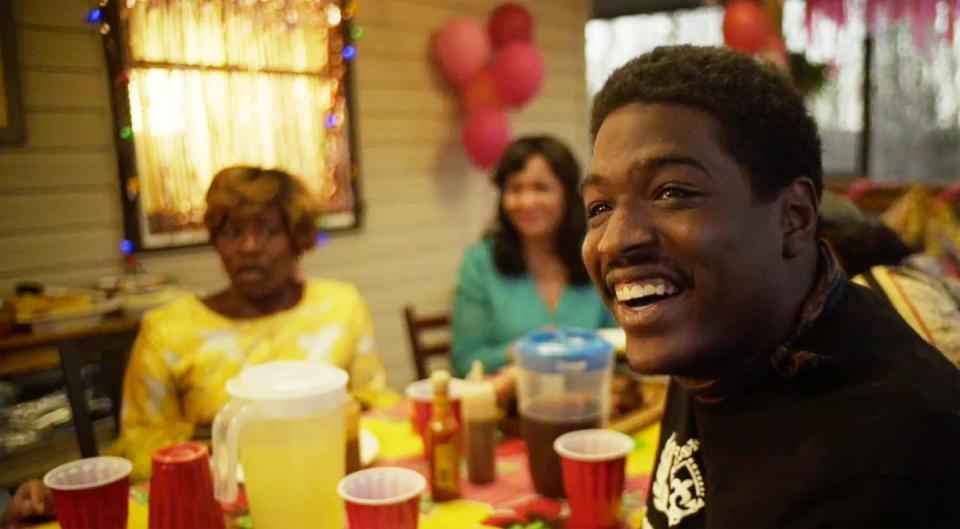How James Ijames Made Shakespeare Black and Queer

- Oops!Something went wrong.Please try again later.
- Oops!Something went wrong.Please try again later.

In May of this year, James Ijames won the 2022 Pulitzer Prize for Drama for his play Fat Ham, a bawdy, Black, funny, and unabashedly queer adaptation (of sorts) of Shakespeare’s Hamlet. Set on a North Carolina pig farm, the play closely follows the beats of the famous tragedy but remixes them into a meditation on masculinity, sexuality, mourning, and joy. Juicy, the play’s protagonist and Hamlet stand-in, is a fat Black queer boy who has just seen the ghost of his father, Pap. Pap has returned to earth for revenge: He claims that his brother, Juicy’s uncle Rev, murdered him in order to marry his wife, Tedra, and visits Juicy on the afternoon of a cookout celebrating their union to demand Juicy kill Rev. Early in the play, Juicy turns to the audience and soliloquies, “Fathers and sons. That shit can get dark. / You know. / When the chemistry ain’t right. When the father / Is too heavy and the son is too light. / When the father thinks the son is too light / When the son is too heavy. / That fucks shit up.” It’s a virtuoso moment that announces Ijames as not only a major talent but also, rarest of things, a writer who surprises his audience.
Here, he tells Harper’s Bazaar about Fat Ham and the play’s conversations around queerness and hauntings, the nature of heaven, and humor as a gateway to the audience in theater.
Growing up, there was a rigidity that I associated with masculinity that I never really fit into. And Hamlet has always been a character that I read as being soft, porous. To me, softness is also about being penetrable. For people who move through the world that way, they’re always catching those “slings and arrows,” to use Shakespeare’s language. But I think the gift is if you can experience those things, they remind you to be softer, to be even more porous. That’s what Juicy, the main character, finds for himself over the course of the play.

Juicy is haunted by the ghost of his father. A haunting is a thing that forces you to see something in a way that you wouldn’t if it weren’t present. In Fat Ham, Juicy would’ve been grudgingly putting up decorations for his mom’s second shotgun wedding and he would’ve just been miserable. But then the haunting comes and he can’t rest. He has to reckon with it. I think that’s what happens when you discover that you’re queer. The way I like to think about queerness is everything about me is pushing against what everybody expects. Everything about me is pushing against “what should be.” And that’s exactly what a haunting is. Being a queer person in the world, you always are forcing people around you to see things in a way they wouldn’t normally see it. One of the things I love about Hamlet is that the ghost is so active. It’s not just a specter that moves through and is a warning or sort of a vibe. In Shakespeare’s Hamlet, the ghost is one that comes to you and says very clearly a thing you need to understand. Hamlet’s father shows up to whoever he needs to show up to in order to get the message out. But in this play, Juicy’s father comes directly to him and only him. It feels ancestral. Legacy and inheritance are these inescapable things. When I’m gone, I leave things in my wake. Being intentional in this life about what you’re leaving, I think, is heaven. When I’m talking about heaven, I’m talking about what I’m trying to create so that when I’m gone, this place is better. I think about that a lot.
My relationship to writing humorously about very difficult things freed me in a lot of ways. I don’t know that I’ve written any play that’s void of humor. I like things that are sophisticated and then fall into something that is very physical and visceral. That’s what makes it funny to me. I always say my sense of humor is a cross between The Three Stooges and the ’90s sitcom Martin. I’m very much informed by Martin Lawrence and Larry, Moe, and Curly.
I have this feeling that the physiology of laughter is roughly the same as weeping. There’s a thing the body needs that’s about release and allowance and permission that’s tied up with laughter and with weeping. When you ask people to laugh, when you offer them the circumstances in which they might laugh, it opens something up in them that then you can say something that they might not hear if they weren’t in that state of being receptive, that state of being open. Laughter is a real portal. It opens the possibility of a different kind of understanding and empathy because laughter is contagious; it passes.
I like the audience to always know that it might be called upon to listen closer or to be in privacy with a character at any given moment, which is why, throughout the play, Juicy speaks to members of the audience and other characters acknowledge them. The breaking of the fourth wall is in Hamlet as well. The soliloquies are supposed to be addressed to the audience, like they’re commiserating. We treat those soliloquies with such reverence. When we do that, they lose a little bit of the, like, “Okay, so listen, I need some help” aspect, which is really what’s happening there. When I think about Elizabethan theater, those plays were blockbusters. Those were the Marvel movies at the time. So people were screaming back at what was happening onstage.

I also fully believe that there’s no such thing as the fourth wall in theater. I think the fourth wall was invented because at some point, there was a director or actor or playwright that was like, “I’m afraid of the audience, so I want them to be quiet and not visible.” All of theater history preceding that moment pushes against that. Shakespeare’s theater, the Globe, is full-daylight acting in the round. There’s no hiding. The Greeks, same thing. If you go all the way back to the beginning of storytelling, there’s no real separation between the people who are experiencing the story and the people who are telling the story. I want my plays to constantly make that more central in the practice of theater, even when we’re inside of a state-of-the-art venue.
The things I’m trying to say with the play are, what if we chose our own pleasure, our own healing over pain, or chose to be ourselves over what someone else wants us to be? I think I’m always trying to write toward Black people. I’m talking directly to people who look like me: marginalized folks who we often feel like we have to fit into a thing. I’m saying you don’t have to do that. Just do what you want to do.
This article originally appeared in the August 2022 issue of Harper's BAZAAR, available on newsstands July 26.
GET THE LATEST ISSUE OF BAZAAR
You Might Also Like

